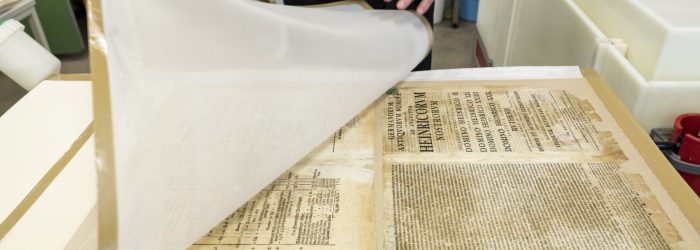Startpage » Collect + Preserve » Conservation
Conservation
Issues of conservation are of great importance, especially for a library with historically important holdings as ours. This involves not only preserving books, but also safeguarding this cultural heritage. Unfortunately, in earlier years, it was not always possible to store the ULB’s historical holdings under ideal conditions. Unfavourable climate and lighting conditions as well as missing or incorrect packaging led in some cases to damage that now urgently needs to be repaired.
Therefore, the ULB Saxony-Anhalt is commited, encompassing various fields of action, to protect its valuable holdings and thus make them permanently accessible for research. The measures taken range from relocation to climate-controlled and light-protected magazines, to the use of suitable protective packaging to mass cleaning, pest monitoring, mass- deacidification, individual restoration and digitisation for reasons of protection.
Supporting this aim, the ULB regularly acquires third-party funding for larger conservation projects.
In the in-house bookbinding workshop, historical holdings as well as selected items published after 1850 are restored by a bookbinder. New bindings and repairs of books are performed there, desolate or loosened stitchings and adhesive bindings are strengthened and brochures are produced. Of special importance is also the preparation and post-processing of library materials included in the digitisation process. If required, boxes and other containers for library materials are also built as well as so-called representative boards cut.
Adjacent to the bookbinding workshop is the restoration workshop, in which two graduate master conservators take care of the conservation of the oldest holdings.
In addition to the practical restoration of books, documents, graphics and other library materials made out of paper, leather and parchment, our conservators are involved in preventive conservation. This includes, for example, monitoring and battling microorganisms (like mould) and parasites (realized in so-called IPM = integrated pest management systems). The state of conservation of the valuable manuscripts, prints and other holdings of the University and State Library are of utmost importance and, if necessary, have to be improved by systematically implementing measures. This ensures that the historical holdings continue to be available to our users. The conservators additionally support research specifically about our objects by answering enquiries about historical materials and production techniques.
The conservators’ tasks further include assessing the ULB’s holdings, drawing up plans and costs for measures and carrying out quality controls, with the purpose being that parts of the holdings can be outsourced to relieve the work carried out in-house. This is done, for example, via programmes funded by the Coordination Office for the Preservation of Written Cultural Heritage (KEK), the Federal Government Commissioner for Culture and the Media (BKM) and the state goverment of Saxony-Anhalt.
Since 2015, seven projects have been realised by funding from the Coordination Office for the Preservation of the Written Cultural Heritage.


